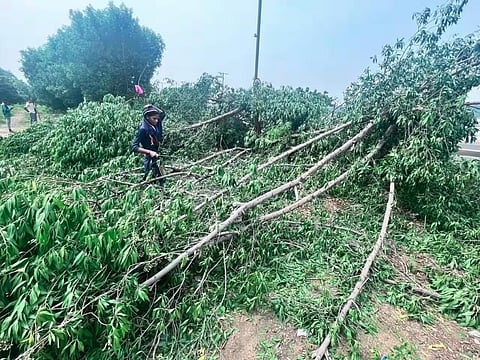

After planting thousands of Conocarpus trees (locally Saptaparni) over the last few years, the civic bodies in Gujarat are now chopping them down after government orders sought a ban on planting the species because of its environmental and health hazards.
The tree was the go-to option for municipal agencies and industrial units of Gujarat engaging in afforestation activities to meet their environmental commitments, till the state government banned its plantation on September 26, 2023.
The order issued by the forest department highlighted the damages the plant causes to environmental and human health.
The move came following years of campaigning by experts who pointed out that the plant is a water-guzzler and can hit the water tables. Large populations of this tree has sped up the evaporation process and its roots choke the drainage pipes, they added.
The plant pollinates twice a year and is also injurious to human health, stated experts, citing a rise in cases of cough, cold, asthma and respiratory disorders.
But for the past few years, the plant has been preferred by government authorities as well as private companies because it grows instantly, can tolerate high temperatures, does not need fresh water streams to grow and bears flowers.
Another reason Conocarpus was chosen by civic bodies and industries seeking to meet their green cover and carbon credit commitments was that the tree can grow using drainage and sewerage waters.
The species was planted in huge numbers at the Sabarmati Riverfront in Ahmedabad, Ram Van in Rajkot as well as public gardens across districts in Gujarat. It was also used during the plantation drive under ‘mission million trees’ in Vadodara, where 24,000 Conocarpus trees were planted in 2017-18.
This resulted in reduction of 100,000 litres per day from the groundwater reserves, the local media reported. The situation could cause water scarcity in the city, the experts had warned.
Also, the fast-growing trees were obstructing CCTV cameras, billboards, signage, hoardings, street lights and electric wires. They needed to be trimmed frequently at a huge cost.
Activism in Gujarat against planting Conocarpus can be traced back to 2020 through social media. Later, the debate also entered the regional television space and finally in the convergent media platforms.
Finally, in April 2023 the Vadodara Municipal Corporation released the data that at least 35,000 Conocarpus trees had been planted in the city limits. It decided to cut down all of them in a phased manner, including the 24,000 planted under mission million trees.
The latest government circular echoes the opinion of environmentalists that the plant doesn’t serve any purpose to the ecosystem other than beautification — no birds nest in it and it doesn’t contribute to enriching biodiversity in any way — and is hazardous to the environment and human health. So, it should not be planted.
“Conocarpus trees flower in winter and spread pollen in nearby areas, it is also learnt that this is causing diseases like cold, cough, asthma, allergy, etc,” the strongly worded order stressed on the side-effects of such plantation on human lives.
Conocarpus trees are an evergreen plant species with dark green shiny leaves. They are not palatable for wild herbivores or domestic animals.
Roots of this species go deep under the soil and develop extensively, damaging telecommunication lines, drainage networks and freshwater systems, the circular underlined.
“Keeping the above facts in mind, nursing of any Conocarpus plant in the departmental plant nurseries and Van Mahotsav nurseries, as well as their plantation in forest area or non-forest area is hereby prohibited,” it read.
The citizens and the forest department should be informed about the adverse impacts of Conocarpus through events like farmer workshops and nature education camps.
The civic bodies across Gujarat mainly Ahmedabad Municipal Corporation, Vadodara Municipal Corporation and Rajkot Municipal Corporation have invested a few millions of their annual budget outlay for beautification of the cities and a part of the amount was spent in planting Conocarpus trees.
After the September 26 orders issued by the forest department, all the civic bodies will invest in chopping down these trees.